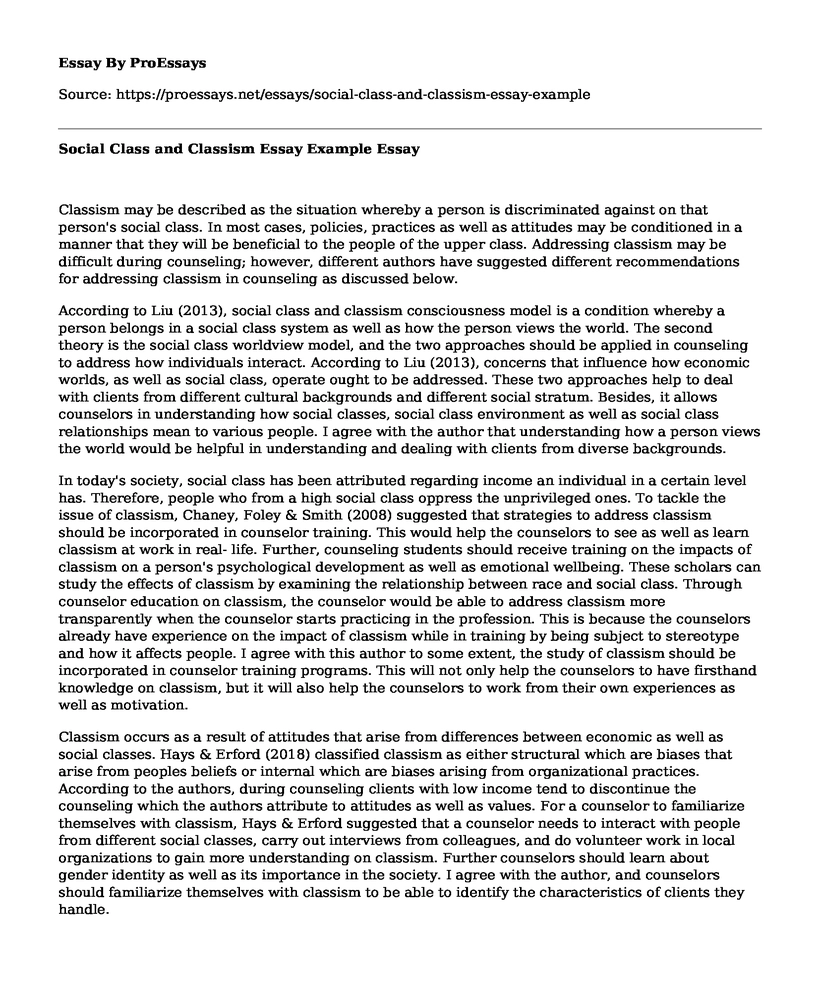Classism may be described as the situation whereby a person is discriminated against on that person's social class. In most cases, policies, practices as well as attitudes may be conditioned in a manner that they will be beneficial to the people of the upper class. Addressing classism may be difficult during counseling; however, different authors have suggested different recommendations for addressing classism in counseling as discussed below.
According to Liu (2013), social class and classism consciousness model is a condition whereby a person belongs in a social class system as well as how the person views the world. The second theory is the social class worldview model, and the two approaches should be applied in counseling to address how individuals interact. According to Liu (2013), concerns that influence how economic worlds, as well as social class, operate ought to be addressed. These two approaches help to deal with clients from different cultural backgrounds and different social stratum. Besides, it allows counselors in understanding how social classes, social class environment as well as social class relationships mean to various people. I agree with the author that understanding how a person views the world would be helpful in understanding and dealing with clients from diverse backgrounds.
In today's society, social class has been attributed regarding income an individual in a certain level has. Therefore, people who from a high social class oppress the unprivileged ones. To tackle the issue of classism, Chaney, Foley & Smith (2008) suggested that strategies to address classism should be incorporated in counselor training. This would help the counselors to see as well as learn classism at work in real- life. Further, counseling students should receive training on the impacts of classism on a person's psychological development as well as emotional wellbeing. These scholars can study the effects of classism by examining the relationship between race and social class. Through counselor education on classism, the counselor would be able to address classism more transparently when the counselor starts practicing in the profession. This is because the counselors already have experience on the impact of classism while in training by being subject to stereotype and how it affects people. I agree with this author to some extent, the study of classism should be incorporated in counselor training programs. This will not only help the counselors to have firsthand knowledge on classism, but it will also help the counselors to work from their own experiences as well as motivation.
Classism occurs as a result of attitudes that arise from differences between economic as well as social classes. Hays & Erford (2018) classified classism as either structural which are biases that arise from peoples beliefs or internal which are biases arising from organizational practices. According to the authors, during counseling clients with low income tend to discontinue the counseling which the authors attribute to attitudes as well as values. For a counselor to familiarize themselves with classism, Hays & Erford suggested that a counselor needs to interact with people from different social classes, carry out interviews from colleagues, and do volunteer work in local organizations to gain more understanding on classism. Further counselors should learn about gender identity as well as its importance in the society. I agree with the author, and counselors should familiarize themselves with classism to be able to identify the characteristics of clients they handle.
Conclusion
In conclusion, the findings above demonstrate the how important it is for a counselor to have prior knowledge of classism before counseling. This is because it makes it easy to deal with various clients from various social classes.
References
Hays, D. G., & Erford, B. T. (2018). Developing multicultural counseling competence: A systems approach (3rd ed.). Upper Saddle River, NJ: Pearson. ISBN: 9780134523804.
Liu, W. M. (2013). Introduction to Social Class and Classism in Counseling Psychology. Oxford Handbooks Online. doi:10.1093/oxfordhb/9780195398250.013.0001
Smith, L., Foley, P. F., & Chaney, M. P. (2008). Addressing Classism, Ableism, and Heterosexism in Counselor Education. Journal of Counseling & Development, 86(3), 303-309. doi:10.1002/j.1556-6678.2008.tb00513.x
Cite this page
Social Class and Classism Essay Example. (2022, Jul 25). Retrieved from https://proessays.net/essays/social-class-and-classism-essay-example
If you are the original author of this essay and no longer wish to have it published on the ProEssays website, please click below to request its removal:
- The Mask You Live In (2015) and the American Idea of Masculinity - Essay Sample
- Race Relation in America Has Gotten Better Since Dr.King Delivered His Speech "I Have A Dream" Essay
- Redlining and Inequality - Essay Sample
- Essay Sample on Women in the American Revolution: Activism and Impact
- Essay Sample on Rethinking Foster Care: Examining Challenges at the Micro-Level
- Listen Up: The Power of Effective Listening in Communication - Essay Sample
- The Division of Duties Along Gender Lines - Essay Sample







